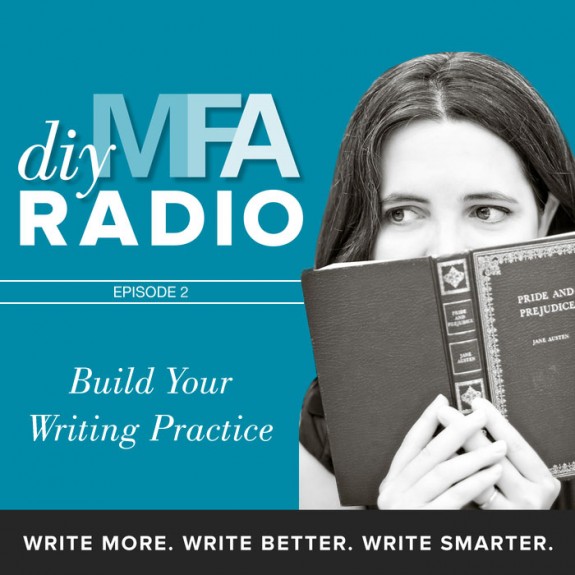Inspiration is for sissies. If you have to wait for inspiration to write, you’re in trouble. This is because you’re at the mercy of your muse, who may or may not choose to take the occasional day (or month) off. To combat this problem, you need to build your writing practice and learn to write even when you don’t feel like it. Remember, anyone can write when it’s easy but real writers write when it’s hard.
While we’re at it, let me dispel a myth about discipline. Writers are not any more disciplined than normal folk. Discipline doesn’t exist. Writers are just uncommonly stubborn and will not let go of their writing. Writing is not about magically “becoming more disciplined,” it’s about sheer force of will and being stubborn takes practice.
In today’s episode, we talk about building a writing practice. If you want to be a writer you need to build a writing practice. This is not unlike how musicians practice etudes or yogis perfect their downward-facing dog. But why do you want to practice? Listen to the show here:
Here are 7 reasons to build your writing practice:
- Practice builds stamina.
- Practice builds skill.
- Practice makes you suffer (in a good way).
- Practice makes the work feel less precious.
- Practice builds mastery.
- Practice helps you see your goals through to the end.
- Practice makes it easier to start again the next day.
Clearly practice is important, but what is a writing practice exactly? What does it look like and how do you put it into action? I think of practice in terms of music, but I think the analogy translates easily to writing. There are four main components to practice.
1) Warm Up Every Day.
Every practice session starts with some warm-up exercise that gets your fingers limber and your chops ready to play. Even if you can’t do a full session, if you just have time to warm up it’s enough to keep that practice momentum going.
In writing terms that might mean just scribbling down a sentence or two, or spending a few minutes brainstorming a scene. The key here is you need to keep your writing fresh in your mind, even if you don’t have time to sit down and work for a long stretch.
2) Practice Your Scales.
I was an impertinent teenager and when my violin teacher would tell me to practice my scales, I’d roll my eyes and say “Why? It’s not like I’ll ever have to play scales at a recital.”
Looking back, I can understand my own logic: when you have a concert coming up, why waste time with scales, arpeggios and etudes when you could be playing your performance piece? Here’s what I didn’t realize at the time: practicing scales (and other exercises) isolates those difficult techniques and allows you to master them in a safe context where the stakes are low. Sure, you might never have to perform a C# Minor Harmonic scale, but if those notes come up in that Bach Partita you’re performing, you’ll be ready. While musicians usually practice scales every day, most writers can get away with doing a writing exercise only once or twice per week.
3) Develop a Well-Rounded Repertoire.
Again, like the exercises, many writers feel like a well-rounded repertoire is a waste of time. If you like to write sci-fi novels, why would you ever want to write a literary short story? If you love to read YA, why would you bother reading anything but that?
In music, though, you need a well-rounded repertoire because you’ll learn different things from different pieces and composers. Every violinist needs to have some Bach in her repertoire, because nothing trains your ear like Back. And Mozart is so clear and transparent that you can’t get away with mistakes the way you could in some flashy piece with lots of fast notes.
The same is true in writing. You’ll learn a lot from both writing and reading different types of literature. Picture books will teach you the power of using as few words as possible to tell your story. And nothing like reading a thriller to help you with pacing. Even if you don’t do it with your writing, strive to build a well-rounded repertoire in what you read.
4) Prepare for a Performance.
My second year in college I won the school’s concerto competition. In the weeks leading up to the audition, I spent more time a practice room than I did in my own dorm. After all, there’s nothing like a deadline to make you knuckle down and get to work.
So too in writing. If you never set deadlines for yourself, you won’t have anything to work toward. Yes, it can feel comfortable working at your own pace and just letting things roll along, but I want to push you out of that comfort zone. You need to set a goal and stick to it. That’s what building a creative practice is about. If you don’t have some goal on the horizon, then practice is pointless.
One more thing about practice…
You’ve probably heard people say that “practice makes perfect,” but the truth is that this isn’t quite the case. Practice doesn’t make perfect, practice makes permanent.
This means that you DO NOT want to practice something that’s not working for you, or you risk making that bad habit permanent. Once a month, make time to evaluate your writing practice and determine what’s working and what’s not. Keep doing what works, but ditch what doesn’t.
Resource Recap
Over the next week, follow these super-simple baby steps to build your writing practice.
- Warm up every day.
- Use the #WriterIgniter and do 2 writing prompts this week (15 min each).
- Read a short story, article or essay in a genre or category you don’t usually read.
- Set a deadline for a larger project.
- Iterate and improve your practice habits. Keep doing what works, stop doing what doesn’t.
Link to Episode 2
(Right-click to download.)
If you liked this episode…
Please head over to iTunes and leave a review. And make sure you subscribe to the podcast so you’ll be first to know when new episodes are available. Finally, if you know anyone who might enjoy this podcast, please share it with them.
Until next time, keep writing and keep being awesome.








